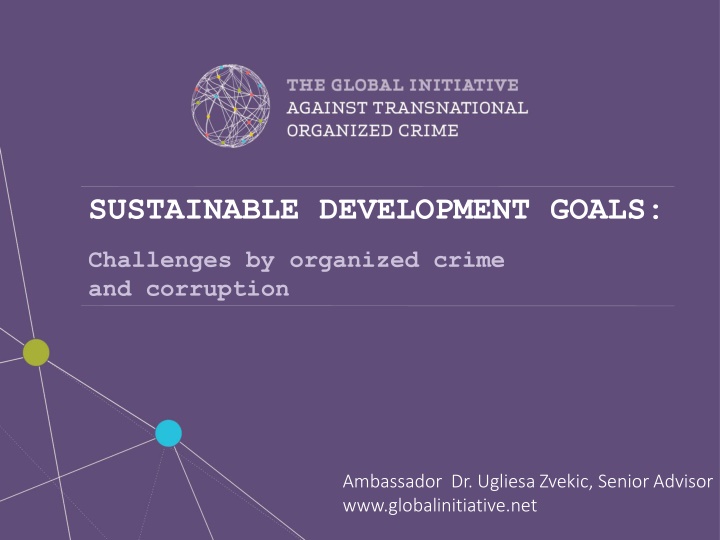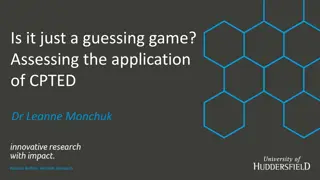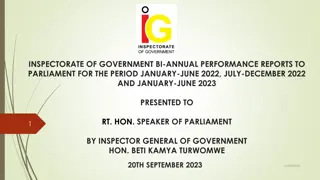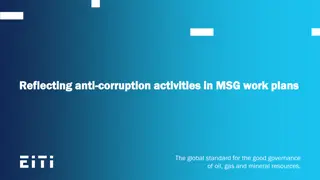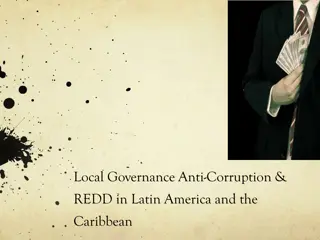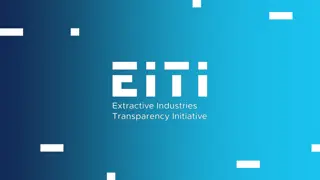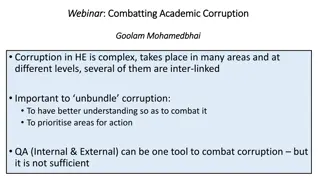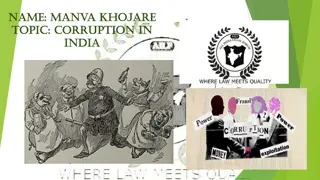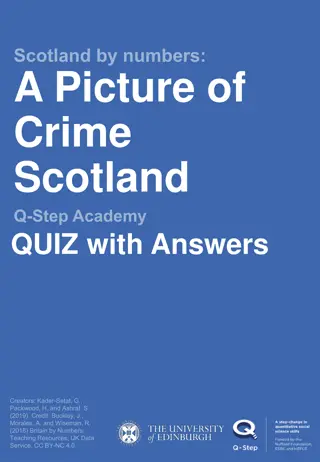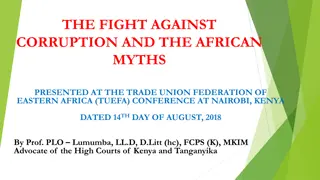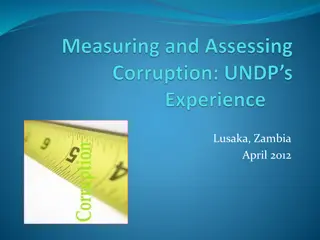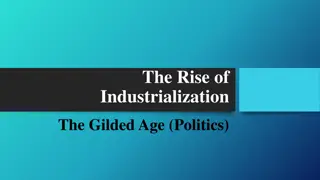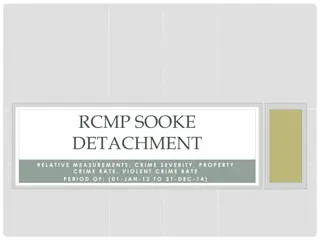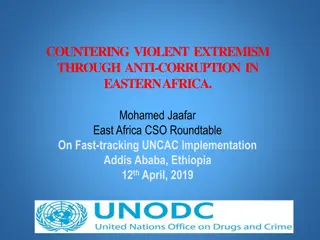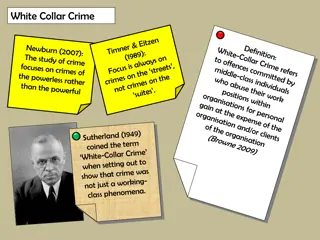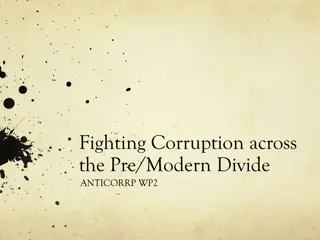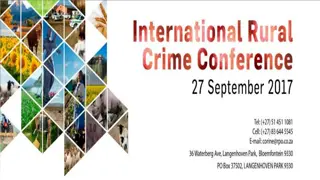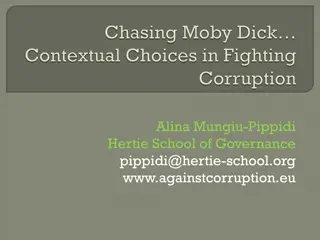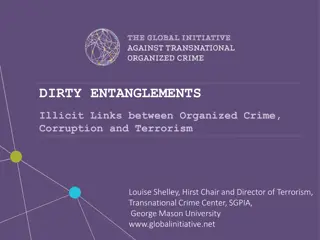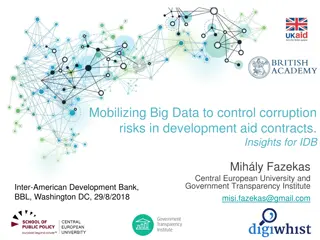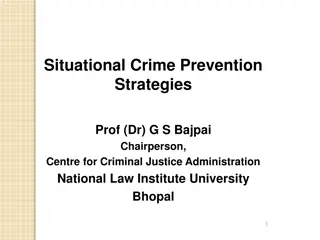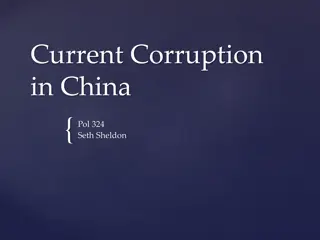Challenges Faced by Sustainable Development Goals Due to Organized Crime and Corruption
Organized crime and corruption present significant challenges to achieving sustainable development goals. This includes shifts in illicit markets, expansion of criminal activities, and geopolitical implications. Legalization and legitimation of illicit activities, as well as developmental uses of organized crime, further complicate efforts in this area. Recognizing these threats as cross-cutting is essential for addressing them effectively.
Download Presentation

Please find below an Image/Link to download the presentation.
The content on the website is provided AS IS for your information and personal use only. It may not be sold, licensed, or shared on other websites without obtaining consent from the author.If you encounter any issues during the download, it is possible that the publisher has removed the file from their server.
You are allowed to download the files provided on this website for personal or commercial use, subject to the condition that they are used lawfully. All files are the property of their respective owners.
The content on the website is provided AS IS for your information and personal use only. It may not be sold, licensed, or shared on other websites without obtaining consent from the author.
E N D
Presentation Transcript
SUSTAINABLE DEVELOPMENT GOALS: Challenges by organized crime and corruption Ambassador Dr. Ugliesa Zvekic, Senior Advisor www.globalinitiative.net
Extent Extent Organized crime is not new but scale and scope have changed New forms and methods of legitimization Impact Impact Shifts in major illicit markets Expansion of new criminal markets and demand for new commodities Blurring of traditional producer, consumer and transit state typologies
Geopolitics of Transnational Criminal Flows Geopolitics of Transnational Criminal Flows and Markets and Markets Suppliers of criminal flows: not anymore mostly developing world and countries in transition Receivers: not only not only North America and West/Central Europe; Asia BUT BUT Geopolitical equilibration Geopolitical equilibration of suppliers and receivers of illicit capital flows, money laundering, corruption, organized crime not anymore mostly from
Legalization & Legitimization Legalization & Legitimization Legitimization of the illicit activities, status and profits as the strategy of the OC/TOC Increased organized corruption both as a means and an end in itself Increased presence of OC in the management and political authority structures to influence and control the process of legalization and legitimization of illicit flows and gains Corruption as a mean for legalization of illicit flows
Developmental Uses of Organized Crime Developmental Uses of Organized Crime and Corruption and Corruption NOT ONLY BY TERRITORIAL AND COMMODITY CONTROL NOT ONLY BY TERRITORIAL AND COMMODITY CONTROL BUT BUT TRADING IN INFLUENCE with PUBLIC ADMINISTRATION and TRADING IN INFLUENCE with PUBLIC ADMINISTRATION and PRIVATE SECTOR PRIVATE SECTOR
Organized crime /Corruption and Organized crime /Corruption and Developmental Platform Developmental Platform Organized crime/Corruption have broader implications than traditional security and justice framework Organized crime and Corruption are now recognized as cross- cutting threats to sustainable development
Sustainable Livelihoods Stability, Justice and Governance Health and Well-Being Development Impact Areas Economy Environment
Goal 16.2: Child abuse Forced Labour Goal 8.7: Forced Labour Sustainable Livelihoods Illegal Migration Goal 10.7: Orderly Migration Sex Goal 5.2: violence against women Trafficking 21m victims of forced labour generate US$150bn in annual profits (US$99bn from sex trade) Child labour in 2013: 168m total (10.6% of all children in the world), 85m in hazardous jobs Sex trafficking worth over US$3bn per year in Eastern Europe alone
Illicit Drug Use Goal 3.3: Epidemics HIV/AIDS Goal 3.5: Substance Abuse Fake Meds Goal 3.3: Epidemics Health and Wellbeing Illicit Tobacco Goal 3.5: Substance Abuse Goal 2.1: End Hunger Food Crimes Goal 2.3: Increase Agricultural Productivity Goal 2.5: Maintain Genetic Diversity 60% or more of medicine in vulnerable countries is falsified. US$5.7 billion worth of fake pesticides sold every year globally 10% of all new HIV infections caused by injecting drugs (one of leading causes of new cases)
Flora & Fauna Goal 15.7: Poaching and trafficking IUU Fishing Goal 14.4: Illegal Fishing Environment Illegal dumping Goal 6.3: Illegal dumping of toxic waste Over 800 kg of fish illegally caught every second, with annual value of US$1.02 trillion Illegal fishing threatens to cause complete collapse of global fish stocks by 2048 Illegal wildlife trade worth US$5-20bn annually (2014 est.) Illegal toxic waste disposal in Italy generates US$21-26bn annually in profits
Illicit Financial Flows Goal 16.4: Illicit financial flows Economy Transfer Mispricing Goal 10.5: Financial Markets Global illicit trade worth est. $3.3 trillion in 2011 (10% of world GDP) Illicit outflows from Africa 1980-2009: US$1.2-1.4 trillion 25% of the value of all imports to the Philippines goes unreported (2014 est)
Goal 11.3: Urbanization Conflict & Violence Goal 16.1: Violent Death Goal 16.4: Arms Trafficking Stability, Justice and Governance Goal 16.5: Corruption and Bribery Corruption Goal 16.6: Integrity of Institutions Goal 16.6: Integrity of Institutions (democracy) Other threats All seven of the countries which are unlikely to meet a single MDG by 2015 are countries that have been affected by high levels of violence At least 650m small arms in civilian hands worldwide, 42-60% of all lethal violence committed with small arms
Maximising Maximising the post the post- -2015 Agenda 2015 Agenda SDGs provides a policy platform and agenda within which a number SDGs provides a policy platform and agenda within which a number of international goals and instruments related to illicit arena may be of international goals and instruments related to illicit arena may be realized and implemented to reduce the negative developmental realized and implemented to reduce the negative developmental impacts of organized crime in consonance with positive values of impacts of organized crime in consonance with positive values of human development within the framework of internationally human development within the framework of internationally accepted human rights and rule of law paradigm accepted human rights and rule of law paradigm
